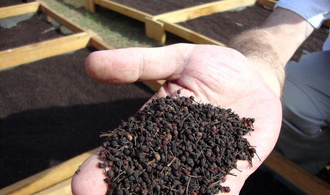Madagascar wild pepper at risk
Written by Modified on the
Threats to the ecosystem
The wild pepper vine wraps it self around forest trees, benefiting from extra light andan ideal humidity for growth. The wild pepper is picked between August to December (the harvesting period). The market has become so vital that some families are now paying employees to work their fields, because the resale ofthis wild pepper brings in more money than any other agricultural product.
Peppervines climb to a height of around 20 to 30 meters. When harvesting the berries,the simplest solution is to cut down the tree. According to Frederic Descroix, researcher at the Cirad (UMR Qualisud) there is a direct effect on the faunaand flora: "there is the immediate effect of deforestation, creating clearings with different luminosity, lower humidity, and in some cases, the disappearance of plant species, including wild pepper it self. At this rate, it could disappear in 10 years. "
The solution: cultivate wild pepper
As part ofthe QualiREG network, researchers from the Cirad and the University of Antananarivo are now working on more sustainable farming methods. The idea is to cultivate certain species of wild pepper. "The cultivation of certain species of wild pepper would satisfy the market while preserving the natural resource, because if the pepper is grown there is no reason to pick it in the forest," said Frederic Descroix. Once the different species of wild pepperfrom Madagascar are identified, the most valuable species would be selected; which would then be grown, and a suitable crop management system would be developed with local people.
Ultimately,it seems that domestication and cultivation of Tsiperifery could well be alasting solution, thus avoiding exploitation and the disappearance of pepperplants in the wild.
Meanwhile, a similar experiment is being conducted on Bourbon Island with species of pepper from Réunion, Piper borbonense. "The wild pepper and soil are different between Reunion and Madagascar. The resulting pepper is likely to have distinct properties. These two products, characteristic of each region,will however benefit from joint research programs within the QualiREG network," says Frederic Descroix.
More information: http://www.qualireg.org/mediatheque/rapports_de_synthese/menace_sur_le_poivre_sauvage


